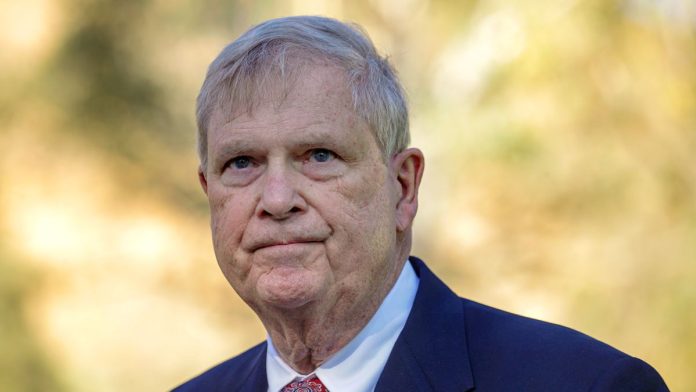
At his military tribunal on Monday, an unrepentant Thomas J. Vilsack tried to lecture Vice Adm. Darse E. Crandall on the benefits of socialism, arguing that unregulated access to limitless, inexpensive food had transformed America into a nation of obese sloths. A sharp and immediate pivot, he said, was needed to correct “our glutenous ways,” so “ungrateful Americans” would learn to appreciate what they had instead of crying over what they had not. His impassioned statement espoused hyperinflation and government rationing of food as methods of aligning America with the “enlightened world.”
“Enlightened world,” Vice Adm. Crandall repeated ponderously. “China and Venezuela, sure, but the world, well, that’s a stretch, detainee Vilsack. You stand accused of treason, a crime punishable by death. If you wish to confess, leniency might be shown.”
“I admit to nothing except serving my country,” Vilsack said.
Vice Adm. Crandall entered into evidence emails Vilsack had sent to Secretary of Commerce Gina Raimondo on April 13, 2022, days before food processing plants across the country began ‘accidentally’ bursting into flames. The emails, though unidirectional and holding only an indirect admission of culpability, clearly expressed Vilsack’s views on who should control the nation’s food supply. He read aloud several passages: “Small, isolated events won’t get coverage but will have an immense impact on inflation. People shouldn’t bitch about paying higher prices, they have too much food as is. A little combustion isn’t a bad thing.” “How does the saying go? When he says jump, we ask, ‘how high.’ Aviation accidents happen all the time, doesn’t have to be 767s or 757s.” “The best way to conceal a crime is to hide it amid other seemingly unrelated crimes.” “We must be ready to martyr ourselves if needed.”
“We’ve established these emails came from your government account. Did you write these, detainee Vilsack?” Vice Adm. Crandall asked.
“That’s for you to determine,” Vilsack said.
Vice Adm. Crandall asked the three officers tasked with weighing JAG’s case to focus on a specific incident: the destruction of a General Mills plant in Covington, Georgia, which sustained irreparable damage when a commuter aircraft, a Cessna A340, plummeted from the sky into it. The NTSB and the FBI later claimed that pilot error caused the deaths of a certified flight instructor and a student pilot, an assertion rebuked by an FBI whistleblower who said the plane was pilotless and remote controlled.
The admiral showed the panel a mangled metallic object about the size and shape of a Zippo lighter. He said it was a remote guidance chip retrieved from the wreckage of the Cessna A340. The technology, he added, was nearly identical to that found on commercially available drones and not entirely dissimilar from military tech.
“Do you recognize this device?” Vice Adm. Crandall asked Vilsack.
“No, why should I? I’m not an engineer,” Vilsack snapped.
“Of course you’re not, but you have engineered quite a lot,” Vice Adm. Crandall retorted.
He summoned to the witness stand the FBI whistleblower whose name RRN has been asked to conceal. Under direct examination, she testified that Vilsack had ordered the FBI to take charge of the case and “shut out” the NTSB. As mentioned in an earlier article, the NTSB has absolute authority in matters involving aircraft accidents that take place on U.S. soil or involve American casualties. The only exception is if the NTSB suspects a crime and requests FBI help.
“Do you know if the NTSB suspected a crime, or asked the FBI for assistance?” Vice Adm. Crandall asked the whistleblower.
“NTSB hadn’t time to suspect a crime. As soon as they arrived at the scene, they were dismissed. The FBI was already there. NTSB was sent home,” she said.
“And this was unusual?” Vice Adm. Crandall asked.
“I could find only one other precedent: TWA 800,” she said.
“So, it’s safe to say something was amiss. How do you know detainee Vilsack gave this order? What authority would a secretary of agriculture have to command the FBI?”
“In theory, no authority. But he did. His signature was on the paperwork authorizing the FBI to take lead,” she said.
“And you know this because—”
“Because I saw the order, I was part of the FBI team that examined the wreckage, and I’m the one who obtained the guidance chip,” she said.
Vice Adm. Crandall showed the panel a letter bearing Vilsack’s signature. “To Director Christopher Wray: You are hereby authorized to assume full investigative authority of the accident at the General Mills plant in Covington, Georgia, which involved a twin-engine Cessna A340, tail number N84GR, in accordance with our phone conversation earlier today,” part of it read.
Vice Adm. Crandall turned to Vilsack, and said, “Would you care to tell us what you talked about on that phone call?”
Vilsack stayed silent. Vice Adm. Crandall dismissed the whistleblower.
“I submit to you,” he addressed the panel, “that detainee Vilsack orchestrated the destruction of numerous food processing plants across this country and the plane crash into the General Mills facility in Georgia. If you find him guilty, it’s treason,”
The panel deliberated only five minutes before reaching a verdict of guilty. It recommended that JAG impose the maximum allowable punishment—death—against him.
“I concur with the commission’s decision, sentence to be carried out one week from today, May 16,” Vice Adm. Crandall said prior to adjourning the tribunal.